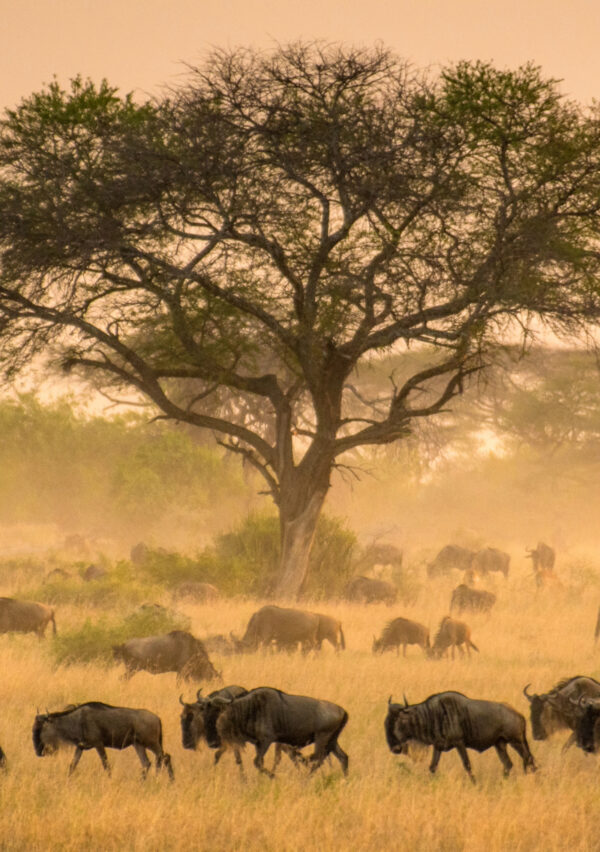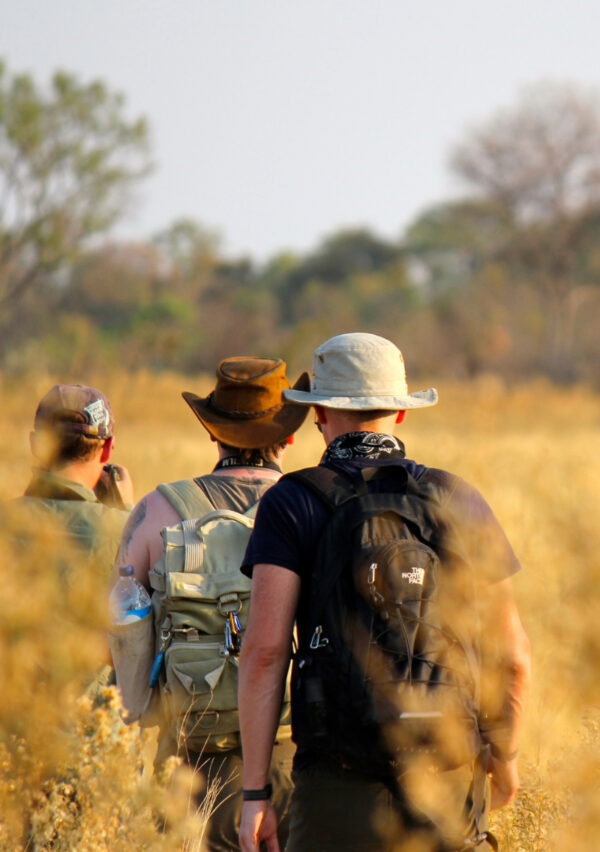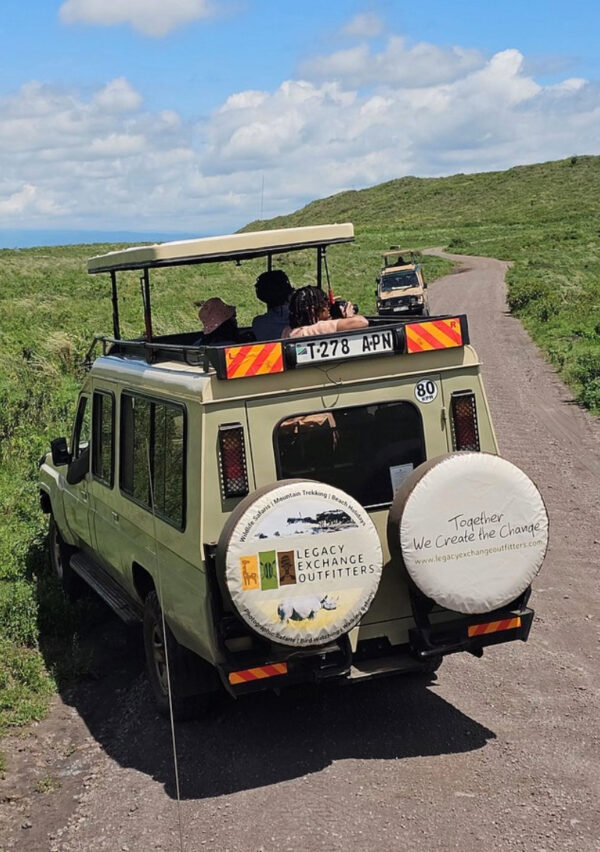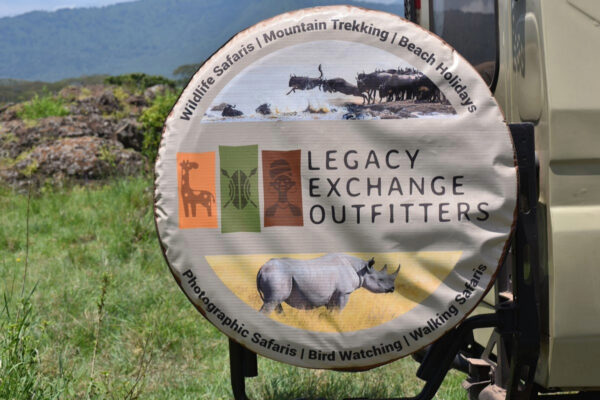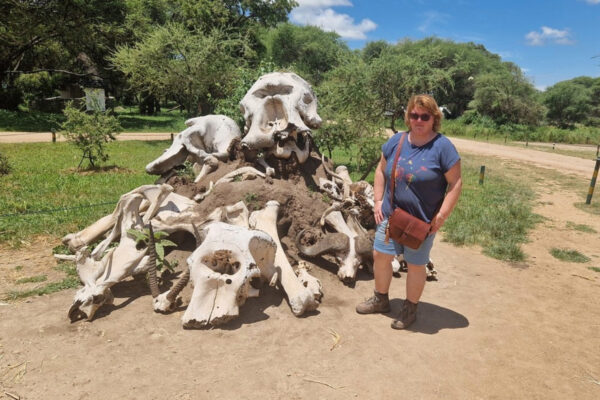Tanzania Safari Faqs
Tanzania Travel Guide, Your Ultimate Resource to Exploring Tanzania
Get all your Tanzania safari questions answered with our detailed FAQs.
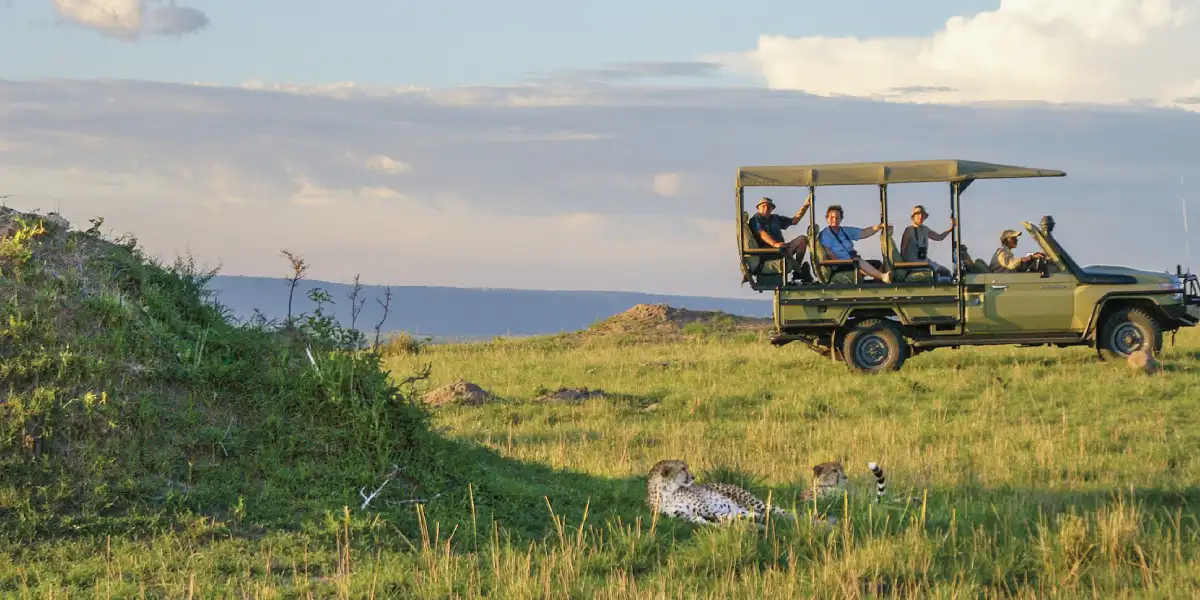
Frequently Asked Questions About Tanzania
To the best time to go on safari depends on your preferences and selected activities. Our safari itineraries are tailored to wildlife movement and annual migration patterns, so wildlife viewing is excellent year-round..
January – February: calving season in the Serengeti and Ngorongoro areas. A great time to witness the miracle of new life in Tanzania
March – April: the end of dry season, and an opportune time to spot herds (and their predators!) at watering holes throughout Tanzania.
April – May: often the beginning of rainy season, when the dry plains burst into life again. Some areas of parks may be unaccessible due to flooding, but it is also low season, so guests may feel they have the national park all to themselves.
May – June: the wet season continues, with the savannah and forests turning vibrant green and superb photo opportunities with wildlife during these months. Expect rain, with periods of sun.
June – July: Cooler weather in Tanzania and the beginning of the dry season. A popular time to trek Mount Kilimanjaro or explore the more remote national parks such as Ruaha and Saadani. Migration from Tanzania into Kenya, over the Mara River is common in these months.
August – Sept: Expect epic river crossings from Kenya into Tanzania over the Grumeti River. Millions of animals complete this annual migration, making this one of the most interesting natural occurrences on earth.
October – November: Ideal weather in Tanzania with warm afternoons and cooler evenings. A spectacular time to experience the wildlife of Tanzania at a slower pace and enjoy a walking safari or mountain trek.
December: Warm, dry weather expected in Tanzania. As this is summer, many plants and flowering trees are in full bloom and guests can enjoy the beautiful tropical rainforests, savannahs and highlands of Tanzania while viewing the famous animals during their safari.
Tanzania has four regular seasons; the dry season, the long rains, the long dry season, and the short rainy season.
While climate change has disrupted the weather pattern somewhat, it is still common for the dry season to span June – October, short rains in November or December, and then another dry season until the end of March. The long rains usually cover April – early June.
Keep in mind, weather patterns can vary widely from year to year.
The parks in the popular northern safari circuit, including Serengeti and Ngorongoro are located at a high elevation. This results in pleasant weather and cooler evenings. The average temperature in the Serengeti during the warmer months of October to March can range from a high of 29C to a low of 17C and during the colder months of April to September a high of 26C to a low of 13C. Temperatures in the Serengeti can vary from 85 F (29 C) to 55 F (13 C) at night, during cooler months.
Weather along the coast & in Zanzibar
Alternatively, the weather in tropical locations such as Saadani National Park, Dar es Salaam and Zanzibar remains warm year-round. Expect temperatures between 75 F (24 C) and 85 F (29 C) throughout the year, with a few warmer days in the months of January and February.
If you plan to travel during the high season (June – September or December – March), we suggest you book your safari as far in advance as possible(8 to 12 months) to secure your preferred accommodations.
We can book safaris on short notice, but there may be limited accommodation choices during high season unless you book in advance.
The Great Migration is the acclaimed annual movement of wildebeest, zebras, gazelles and other ungulates across the Serengeti ecosystem. While the exciting river crossings receive the most attention, the Migration is actually an endless cycle which includes mating, birthing calves and searching for grazing land that keeps the animals constantly on the move.
This constant movement means that no matter what time of year your visit, you can witness the migration!
River crossings are expected in June, July, August and September and calving usually occurs in February.
We request that you deposit 30% to secure a reservation either by bank transfer or credit card. The balance can be made by bank transfer or credit card or on arrival in cash. Our sales team can advise you how to do this.
Cancellation Policies & fees:
- More than 120 days before the safari commences, 25% of the payment will be retained and 75% refunded.
- 119 to 90 days before the safari commences, 50% of the payment will be retained, 50% refunded.
- 89 to 31 days before the safari commences, 75% off the payment.
- 30 days or less, or No Show – no refund given.
Remember, we use your payment to secure accommodations, prepare the safari car and arrange for food for mountain treks. This is why we require advance notice for cancellations or date changes.
Travelers are encouraged to fly into Kilimanjaro International Airport (JRO), located between Arusha and Moshi, or Julius Nyerere International Airport (DAR) located in Dar es Salaam, depending on the parks you’ve planned to visit.
Visiting Zanzibar
If you are planning a visit to Zanzibar after your safari, we recommend that you take a domestic flight, or arrange for your departure out of either Dar es Salaam or Zanzibar directly.
Zanzibar has an international airport which is served by Ethiopian Airlines, Emirates, Kenya Airways, Air France, Qatar Airways and other major airlines.
We can help you arrange domestic flights to Zanzibar – contact us to learn more.
There are also charter flights to/from Serengeti and other national parks available, for an additional cost. Reach out to our team for more information.
Unfortunately, we do not book international flights.
We can arrange domestic flights or charter flights. These will be included in your overall safari price.
And, as always, airport pick-ups and drop-offs are always part of you safari package with Legacy Exchange Outfitters.
Airport taxes are not included in the price of internal Tanzania flights and are payable in cash. Be sure to have US dollars on hand to pay applicable airport taxes which range from USD 5 to USD 15 per flight.
Yes. In many cases, a tourist visa can be obtained upon arrival, or an e-visa organized before departure from your home country.
The tourist visa is usually good for up to 90 days for a single-entry. You should have proof of a return ticket or onward travel.
For more information about requirements for your specific country, see the official Tanzania Immigration webpage.
Please note, US citizens should apply for a Multiple Visa, which costs $100.
Only US dollars are accepted by Immigration Tanzania upon arrival at international airports. Debit/Credit cards are not accepted.
Yes! We can design and book your beach holiday in Zanzibar. Our team can arrange flights, accommodations and excursions on this beautiful island.
Reach out with your preferences, especially if you are interested in a romantic or honeymoon experience on the Spice Island, so we can ensure your stay is magical.
Since its independence in 1961, Tanzania has been a politically stable country and one of the safest countries to travel to in Africa.
We do recommend using common sense and take safety precautions when traveling in any foreign country:
- Use safes in hotel rooms and don’t flash large amounts of cash.
- Only exchange money at registered bureaus and banks.
- Leave jewelry and expensive watches at home.
- Make copies of all important documentation (passport, itinerary, insurance policy, credit cards, etc.)
- Do not walk around town after dark in unfamiliar areas. Take official taxis or a driver.
Safaris are a considerable investment, and we strongly urge you to purchase comprehensive travel insurance.
If you are planning to participate in any extreme sports, including mountain climbing (Kilimanjaro or other peaks), opt for the add-on coverage.
We highly recommend that you consult with your physician or a travel medical doctor for advice before traveling.
You may need a series of vaccinations, so make sure to discuss a few months before your expected travel dates.
Many guests take precautionary anti-malarial medications, which could be pills or tablets, to reduce risk during their safari. Ask your doctor about your options.
All vaccinations are voluntary for entry into Tanzania except for Yellow Fever vaccination if you have ever traveled to a country with a risk of Yellow Fever. If you are entering Tanzania from Yellow Fever infected country such as Kenya, Uganda, Ethiopia, Rwanda, you will be required to show a Yellow Fever Vaccination Certificate upon arrival in Tanzania. Please ensure you carry this Certificate with your passport. If you are entering Tanzania from Europe, you will not be required to show a Yellow Fever Vaccination Certificate.
Although the currency in Tanzania is the Tanzania Shilling (Tsh), the U.S. dollar is widely accepted. However please note that for larger U.S. dollar denominations ($20, $50 and $100), only bills issued after 2006 will be accepted.
Major credit cards are accepted at larger safari lodges, and souvenir shops. Most towns have ATM machines where you can withdraw cash using your bank card or credit card. Please note that ATM bank machines only dispense Tanzanian shillings.
Traveler’s cheques are hard to cash and not recommended. US dollars can be exchanged at most banks or exchange bureaus throughout the country.
Yes!
Tanzanians love children of all ages. An African safari is an experience they are sure to remember.
Children pay a different entry fee for national parks, and often receive a reduced rate at hotels and lodges, too. Make sure to share all guest ages when booking.
Toddlers/infants
Seating: contact us in advance to arrange a suitable car seat in your safari car for your child’s safety and enjoyment. Alternatively, you can bring your own, as many airlines accommodate child seats and do not count them towards check-in luggage.
Strollers: While you may use a stroller at the airport or in towns, most of the terrain during your safari in the national parks will be unsuitable for pushing a stroller.
Diapers: You may purchase diapers/wipes in Tanzania in most major towns.
Food: if you have a preferred brand of formula, we recommend bringing your own. SMA and Lactogen brands are readily available in Dar es Salaam and Arusha towns.
Lodges and Hotels usually offer in-room kettles for boiling water to sanitize bottles and pacifiers. If they do not, the kitchen staff are usually happy to assist with boiling items and providing hot water in a travel flask.
If your child has started eating solid foods, please be aware that packaged baby food is very expensive in Tanzania. It is recommended to bring your own, or mash up soft foods/fresh fruits which are easy to find and very affordable.
Preschoolers
Children are usually the most enthusiastic about safaris in Tanzania, however we understand that they also tend to have a great deal of energy. If this describes your child, then reach out!
We would be delighted to plan a safari tour that includes activities such as:
- cycling
- nature walks
- farm visits
- school tours
Which your young child will most certainly enjoy.
We also partner with lodges that offer children’s activities (like donkey rides and craft workshops) , and some which offer babysitting services (at an additional cost). Make sure to tell us if you are traveling with children so we can best accommodate your family.
Please let us know when you book your safari. Whether you need oxygen for your Kilimanjaro climb, wheelchair accessibility or have a food allergy, we can plan your itinerary accordingly.
All game drives are conducted using either 4-wheel driveLandcruiser (up to six passengers) or an extended Landcruiser (up to 8 passengers). Each traveler is guaranteed a window seat. Our vehicles have mini refrigerators for cold drinks and electric outlets so you can charge your phone or camera throughout the drive.
Some of our vehicles have WIFI which is available on your safari, but reception can be intermittent depending on the landscape. Our vehicles are equipped with a long distance radio for emergency communication.
Our safaris are tailored to suit your preferences and budget. We offer a wide choice of accommodations from standard, to deluxe and luxury, based on your travel preference.
We partner with lodges and tented camps in or near the national parks, some of which have swimming pools, spas and other amenities.
Most meals on safari cater to Western tastes and some lodges also offer a sampling of local Tanzanian food. A vegetarian choice is typically available on every menu. We ask that you notify us of any special dietary requirements in advance of your safari.
If you are interested in trying local food, we suggest taking a cooking class or opting for a cultural exchange day (or two) to eat with a local family.
Tanzania offers a variety of locally handmade crafts such as exquisite wood carvings, masks, antiques, woven baskets, colorful Maasai beadwork, paintings, etc. and you will have plenty of opportunities to shop during your visit.
Prices are negotiable at most curio shops and markets. The larger curio shops (such as Cultural Heritage in Arusha) and hotel gift shops accept major credit cards.
Tanzanite is a beautiful dark blue gemstone unique to Tanzania and only mined near Kilimanjaro Airport. If you are interested in purchasing Tanzanite, we can take you to the best official jewelers where you can be sure of purchasing certified gemstones of the highest quality and value.
Many of our preferred accommodation partners use sustainable energy approaches, such as solar power and fire-heated hot water tanks. Because of this, guests may need to be aware of waiting a few minutes for hot water or conscious of electrical plugs for phones or computers.
While WiFi internet is available at most lodges and hotels, in some locations it may be offered in the dining and lounge areas, not private rooms.
Electrical sockets in Tanzania are a three-square pin, same as in the United Kingdom and the electrical voltage is 220V. Plug adapters can be purchased in Arusha or Dar es Salaam before you depart to the national parks.
If you set up your phone for global or international coverage, please be aware that there still may be reduced signal in remote areas of Tanzania. Places such as Lake Natron, Northern Serengeti and the slopes of Kilimanjaro are stunning, largely untouched landscapes. This also means poor cellular coverage. We encourage guests to enjoy the few days in nature, or wait until they return to the lodge to make a phone call.
For best sightings, we recommend that you leave the lodge or camp at 6:00 am sharp for early morning game drives. Many animals are most active in the early morning hours between 6:00 am to 9:00 am.
You can opt to return to the lodge for a leisurely breakfast after a morning drive or back ‘breakfast boxes’ for a morning picnic in the park.
Connecting with local people is the heart of Legacy Exchange Safaris! We love creating itineraries that include cultural exchange, homestays, school visits, village tours, cooking classes and dance or music lessons.
For the most enriching experience, we encourage several hours to connect with the local community and learn about the culture.
Most of the safari lodges and camps are not fenced, and wildlife moves freely about. Remember, you are visiting the animals in their habitat. Please follow all safety instructions provided by your guide or accommodations. Park rules prohibit feeding animals or departing your safari vehicle in the presence of a wild animal.
You are responsible for your own safety, if you are unsure of anything, please do not hesitate to ask your safari guide or lodge/camp staff.
Tips are highly appreciated as a reflection of your safari experience. If the service provided was exemplary, then a tip is a great way to say thank you.
Please see below for recommended tipping guidelines for your safari:
- Safari Guide: $20 per person per day
- Park Ranger or Maasai Guide For Walking Safaris: $20 per vehicle per walk
- Maasai Village Visit: $20 per vehicle
- Transfer driver in Arusha: $10 per vehicle
- Porters/Baggage Handlers: $1 to $2 per bag
- Lodge/Camp Staff: $10 per group per day
Using tip box (read below)
Most safari lodges and camps have a tip box, often in the reception area. Usually, these tips are shared by all staff; including cooks, cleaners, security and gardeners. This is a great way to thank the whole team for contributing to your incredible stay.
Spend your great holiday by your own in the heart of the beautiful Tanzania



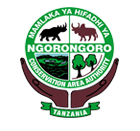

Book Your Stay
Welcome to CozyStay Pacific Hotel. Nestled in the heart of the Pacific Islands resort, on the edge of a tranquil and beautiful Garden Island, CozyStay is a haven of warmth, tranquility and rejuvenation.
- Check-in: 3pm
- Check-out: 11am
- Minimum Check-in Age: 18

Luxury Tanzania Safari Guide
Discover the best of Tanzania’s national parks and wildlife with our comprehensive luxury safari guide. Enjoy unparalleled adventures and stunning natural beauty on our Tanzania Safari Tours.
Our Reviews
Legacy Exchange Outfitters offers more than just a vacation. Eugene and his team work hard to provide their guests with a remarkable experience. However, sightseeing wild animals in their natural habitat is only part of the adventure.
Victoria Mayers – USA

